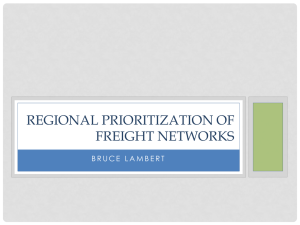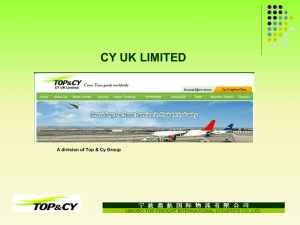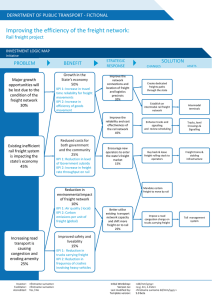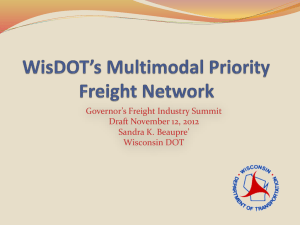National and Regional Transport Planning
advertisement
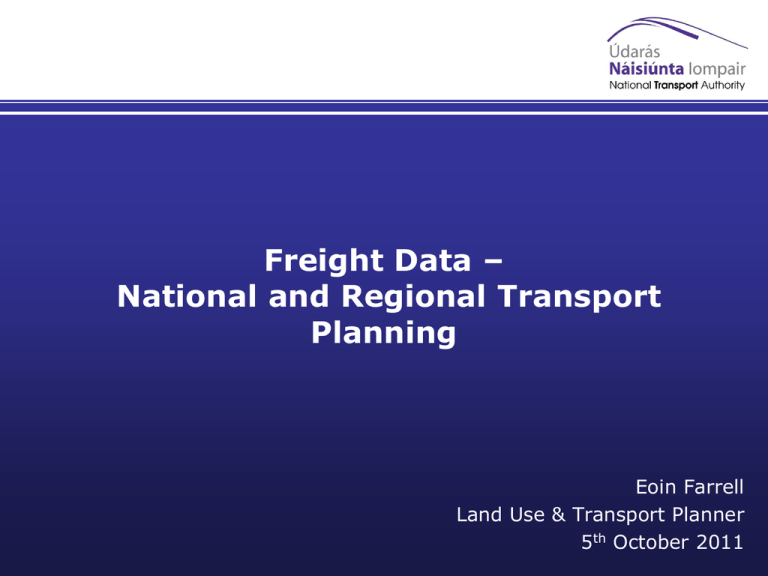
Freight Data – National and Regional Transport Planning Eoin Farrell Land Use & Transport Planner 5th October 2011 Overview • Role of National Transport Authority (NTA) • NTA approach to Freight Analysis • National Transport Model • Regional Freight Strategy for the GDA – NTA Survey of Commercial Freight Managers in the GDA • Data Requirements The National Transport Authority • Established on 1st December 2009 • Responsible for a range of functions within the Greater Dublin Area and also Nationally, including; • Transport planning and investment GDA Transport Strategy Other regional cities • Delivery of PT nationally • Bus / taxi regulation nationally NTA Freight Analysis DATA ANALYSIS POLICY CSO, Survey Data, sector input Policy Formulation, Planning, Investment Priorities National & GDA Transport Models The National Transport Model • Feasibility study commissioned by EPA, DoTT&S and NTA (completed March 2011) • Enable policy intervention testing, and impacts of GHG emissions. • Multi-modal model, allowing more detailed representation of travel behaviour and demand. • Utilise current data sources & effective use of existing models. • Model will include both passenger and freight movements – not currently done • Spatially Detailed – DED level The National Transport Model KEY DATA Receiving Environment Origin – Dest / Commodity Type Regional Freight Strategy for the GDA • Preliminary scoping document prepared • Process of initial Consultation with key stakeholders underway • OBJECTIVE – based on work carried out for the draft NTA Transport Strategy for the GDA “Develop a regional freight strategy for the Greater Dublin Area in order to optimise freight movement in the region, balancing the needs of the freight industry with the environmental and traffic management objectives of the region. An important aspect of the freight strategy will also be to facilitate a greater alignment between freight activity and land use planning and strategic traffic management. The freight strategy will also provide a framework for stakeholder involvement and data collection on an on-going basis.” Regional Freight Strategy for the GDA PROCESS • Review • Baseline Study of Current Patterns, Consultation, Freight Strategy Mechanisms • Development of a Freight Strategy • This will feed into the Dublin City Traffic Management Plan & inform the planning of freight management at the local level NTA Data Sources National Transport Authority Survey of Freight Managers* February/March 2010 343 face-to-face interviews *Commissioned as part of the EU SMARTFREIGHT Project NTA Data Sources Breakdown of Survey Section 1: Profile Company & Fleet Description Section 2: Description of Information & Technology Used Section 3: Transport Issues Profile - Vehicles Which of the following vehicles does your fleet consist of? Base: 343 Current use of Information Base: 343 Used by driver Used by depot manager Noted Problem Areas Dublin City Centre 58 Dublin County 25 M50 20 Tallaght 10 Galway 8 County Wicklow 5 The Quays, Dublin 5 Cork 5 Naas Road / N7 3 Lucan, M4 3 0 Base: 85 20 40 60 % 80 100 5 axle Cordon Ban Satisfaction Quite dissatisfied Very dissatisfied Quite satisfied Neither / Nor Very satisfied Don’t Know Mean Location -4 -5 18 22 9% 42% 3.86 Operation -4 -5 18 22 9% 42% 3.85 Enforcement -4 -5 17 -70 Base: 343 -50 -30 -10 10 % 10% 22 30 50 70 42% 90 3.82 Data Requirements • Collation / Standardisation of data is important starting point • Origin – Destination Information – Spatially defined (taking into account need for Anonymised records) – Link vehicle type, goods type, to journey data – allows link to Land Use Planning data & use for forecasting purposes • On-going consultation / dissemination of information Thank You (01)8798323 eoin@nationaltransport.ie Eoin Farrell Land Use & Transport Planner 5th October 2011

